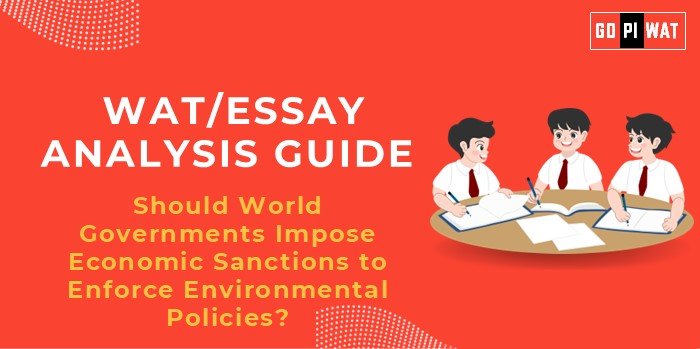📋 WAT/Essay Analysis Guide: Should World Governments Impose Economic Sanctions to Enforce Environmental Policies?
🌐 Understanding the Topic’s Importance
Economic sanctions to enforce environmental policies intersect international relations and sustainability, presenting a critical issue for B-schools focusing on policy analysis and global strategies.
📝 Effective Planning and Writing
- ⏱️ Time Allocation:
- 🕒 Planning: 5 minutes
- ✍️ Writing: 20 minutes
- 🔄 Review: 5 minutes
- 💡 Preparation Tips:
- Note cases like EU CBAM and Brazil deforestation penalties for evidence.
💡 Introduction Techniques for Essays
- 🌍 Problem-Solution Approach: “Climate change is a global crisis requiring collective action. Sanctions offer a potential solution but demand careful consideration of fairness and effectiveness.”
- 📜 Historical Perspective: “Since the Paris Accord, global efforts have been uneven. Economic sanctions now emerge as a pivotal enforcement tool.”
📋 Structuring the Essay Body
- 🏆 Achievements: Discuss EU’s CBAM and Norway’s transition as successes.
- ⚠️ Challenges: Analyze resistance from developing nations and risk of economic inequality.
- 🚀 Future Outlook: Propose collaborative sanctions frameworks ensuring fairness and innovation.
📄 Concluding Effectively
- ⚖️ Balanced Approach: “Economic sanctions are powerful but require equitable application to achieve environmental goals without deepening global inequalities.”
- 🌍 Global Comparison Approach: “Drawing from the EU and Norway’s successes, sanctions can work if supported by global cooperation.”
📊 Analyzing Successes and Shortcomings
- 🏆 Key Achievements: EU policies’ impact on sustainable practices globally.
- ⚠️ Ongoing Challenges: Addressing economic retaliation and fairness.
- 🌍 Global Context: Use cases like China’s coal reduction and Brazil’s forest preservation efforts.
📊 Recommendations for Sustainable Progress
- ⚖️ Develop an equitable sanctions framework.
- 🤝 Encourage technology-sharing initiatives to support developing nations.
✍️ Sample Short Essays
- ⚖️ Balanced Perspective: “Economic sanctions are a double-edged sword, capable of promoting environmental compliance but risking global inequality. Their success depends on equitable frameworks and international collaboration.”
- 💡 Solution-Oriented: “To address climate change, sanctions must be coupled with support systems like green technology transfers, ensuring fairness while driving compliance.”
- 🌍 Global Comparison: “Drawing lessons from Norway and the EU, sanctions can align global trade with environmental goals if implemented with fairness and innovation.”


